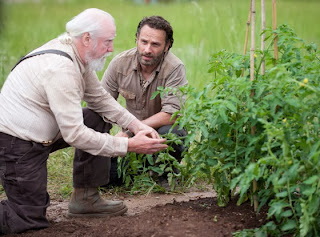Farmer Rick's Post-Zombie Apocalypse Oasis
"For the Lord is good and his love endures forever; his faithfulness continues through all generations." — Psalm 100:5
A lot of people watch "The Walking Dead," and most of them tune in for the carnage. After all, it's based on a popular graphic novel and it's about zombies. Carnage goes with the territory. Much like "Zombieland," recaps of "The Walking Dead" often include a zombie kill of the week.
I don't mind the zombie action, but that's not why I tune in. I have long been fascinated about the bigger moral and societal questions contained in the series. When it is at its best, I think "The Walking Dead" says something about humanity. And for three seasons, most of what it has had to say has been grim.
I was a bit thrown off when the fourth season premiered. The typical carnage sequence dotted the end of the episode, but most of it was spent showcasing a sort of utopia, in a prison, in the middle of the zombie apocalypse. Rick (Andrew Lincoln), the focal hero of the show, had traded in his gun for a few crops and a cadre of pigs. He was living as a simple farmer, trying to instill those values in his son.
Others in the newfound prison colony were falling in love, teaching children, and enjoying some peace and safety. For a show that has been laser focused on the downward spiral of humanity it seemed odd. In the second and third episodes, we've seen a glimpse of the larger point.
There have been two emotionally connective moments for me in the second and third episode. The first came in episode two, as Rick sacrificed his pigs to the zombie hordes in order to save the people in the prison. It was a surprisingly touching moment — one that said a lot about the growth of Rick as a character and "Walking Dead" as a three-dimensional series.
Rick was ashamed at what he had become in the name of survival earlier in the series. More than that, he was worried about the legacy he was leaving his son. Carl was on the edge of becoming a monster. For Rick, giving up the gun and focusing on a simple, peaceful existence was restorative. It was wistful and hopeful. And sacrificing his pigs was a realization it wasn't to last.
Still, I have hope that Rick has become a slightly different person. He's more reflective and, perhaps, more controlled. He recognizes the hard edge needed to survive in the new world order, but he also realizes the importance of tightly gripping your humanity along the way.
The second scene that really moved me happened in Sunday's third episode. An infection now rages in the prison, offering yet another challenge to those seeking to survive a world gone made. Hershel (Scott Wilson), supposed to be in quarantine for his own protection, feels an ache for his fellow survivors — so much so he is willing to risk his life and health to bring them comfort.
When Rick and his daughter, Maggie (Lauren Cohan), challenge him, Herschel offers a simply response about the state of the world and his call to action. “You walk outside, you risk your life. You take a drink of water, you risk your life. Nowadays you breath and you risk your life,” he says. “You don’t have a choice. The only thing you can choose is what you’re risking it for.”
For a long time I have been saddened by the outlook of "The Walking Dead." It's plot seemed to reinforce the idea that compassion was weakness and there was no redemption. Those who had hope had gone soft. Those who risked for their fellow man were fools. Often them met a violent end. I had even come to believe that the post-zombie reality mirrored an idea of purgatory — that those that found redemption were the ones allowed to be killed and end their suffering. The idea that the real punishment and misery was to continue living in that world.
But Herschel's proclamation made me see the story a bit different. It's not about finding redemption to leave the world, it's about finding the hope and courage to stick to your convictions, to care for your fellow man, and to maintain your humanity, decency, and compassion in a world gone mad. That is what's worth living for, and as Herschel points out, that is what is worth dying for.
I've been burned by "The Walking Dead" before, but the last two episodes gave me something to believe in.




Comments
Post a Comment